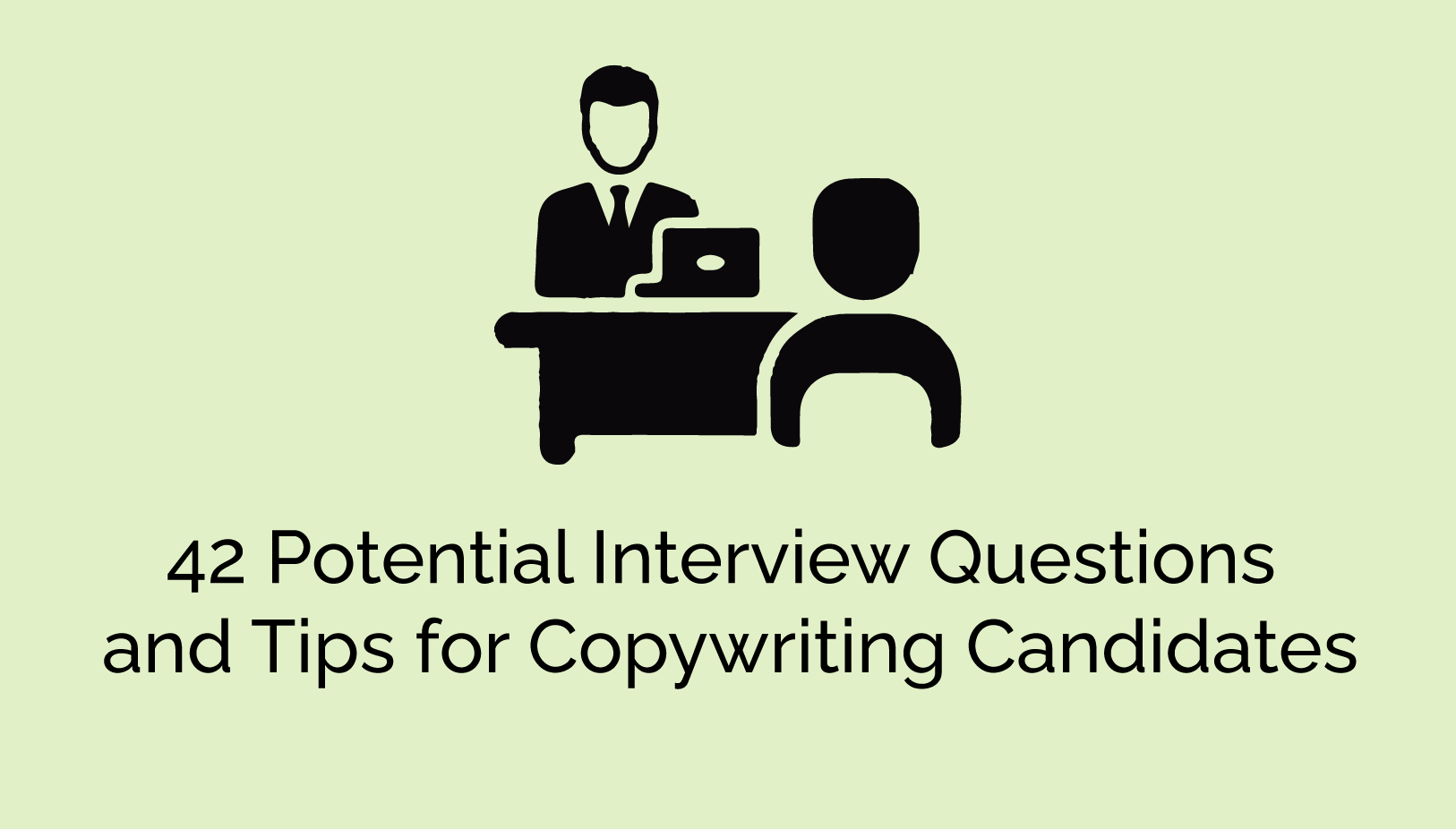Copywriting is an increasingly competitive industry and, when you get that interview scheduled, it is important that you are as prepared as you can be. Here is a list of 42 potential interview questions and tips for copywriting candidates.
Q01: How Would You Describe Your Writing?
Everybody has a personal style. It’s up to you to be able to identify your style and adequately convey this to the interviewer. Some writers are more direct than others whereas others may be a little more creative and flamboyant. In the copywriting industry it is phenomenal if you are able to adapt your style according to the project you are busy with. Being adept in the art of persuasion is an element that interviewers will find positive.
Q02: Which of Your Portfolio Pieces is your Favourite?
The more diverse your portfolio is, the better it will be for showcasing your skill set to potential employers or clients. Make sure that your favourite piece in your portfolio portrays the skills necessary to be favourable to the interviewer, and that you can give reasons that are applicable to the application you are making. Every copywriter should have more than one favoured piece with different reasons therefore – select wisely when answering.

Q03: Who is Your Favourite Copywriter?
Every copywriter should be keeping up-to-date with the latest musings of other copywriters. We should all be constantly trying to improve our skills and learning from revered names in our industry via blog posts, social media or hardcopy. We all have our favourites. Mentioning the reasons why you favour certain ones as opposed to just giving names will assist in helping the interviewer to understand you more.
Q04: Have You Looked at Our Website?
Prior to an interview, you should have researched the company you are applying to extensively. Knowledge is an advantage and the more you are able to comment on the website in question, the more favourably you will be viewed by the interviewer. So put on your professional cap prior to an interview and research the company’s website, blog posts and social media posts as extensively as you can. Give constructive criticism where warranted but don’t overdo it – give as many favourable comments as possible, even singling out a specific article or section as a favourite. All interviewers want to hear positive input.
Q05: How Long Do You Spend Researching and Writing?
This answer is entirely subjective and depends on the project. Original content on blog posts requires more research whereas social media posts probably don’t require as much. Answer accordingly, but be aware that, especially for long content, more time should be spent on research than on the actual writing itself. Clearly, the existing knowledge that you already possess before going into a project might mean less research is required.
Q06: What Does ‘Blog Post Success’ Mean to You?
Blog post success depends entirely on your goals and what you are looking to achieve from your post. Increased traffic to your blog due to a specific blog post can mean the post is successful, especially if your post is getting shared and extending your reach. Engagement on blogs is not as common anymore, but comments and shares on social media can also define success. Emails applauding your blog post and how it has made difference to the senders should be highly regarded as it means your audience is reacting favourably. A blog post is a secondary source when seeking conversions so any referrals from your blog that creates sales are very positive.
Q07: How Do You Think People Find Our Content?
Again, your answer will depend entirely on the research you’ve done into the company. The more company platforms that you can visit prior to your interview, the better idea you will have and the greater your ability to answer this question will be.

Q08: How Would You Improve Our SEO?
Firstly, you would need to weigh up how much the current SEO needs improvement. Then you’d be able to identify where improvement is required. Improving SEO means publishing more relevant content while using bold and italic text and headline tags to highlight key phrases. Improving key words and phrases and the website’s positioning using strong meta descriptions and other metadata will also improve SEO. Finally, updating your content regularly and ensuring that the website itself is link-worthy are further means of improving the site’s ranking.
Q09: What Content Management Platforms are Familiar to You?
It all depends on which platforms you have used as to how you can answer this question. Most companies will be looking for WordPress in your answer as this is the most commonly used platform, but experience on Adobe Experience Manager, Sitecore CMS or Issuu, among others, will be likely to draw favourable expressions from your interviewer.
Q10: What Copywriting Software Can You Use?
This answer is also entirely subjective depending on what you have used. There are a number of effective free or low-cost SEO tools, writing aids, picture and illustration tools, graph generators, backlink detectors and analysers, and content generators available that warrant investigation. For example, ContentBot is an AI content generator that allows you to generate long copy, blog headlines, intros and topics, listicles and much more whilst also incorporating a plagiarism checker and a sentence completer as part of its arsenal. Tools like these are worth investigating and trying prior to starting an interview process.
Q11: How Do You Go About Proofreading and Checking Your Grammar and Spelling?
Correct grammar and spelling is imperative for a copywriter. Fortunately these days, most word processing programs have built-in spellcheckers which make our tasks easier but even they should not be relied on completely. Proofreading aloud after completing your copy is one way of identifying potential grammatical errors and, if there is still doubt, don’t be afraid to pop your questionable copy into Google either.
Q12: What are the Content Guidelines You Would Give the Design Team?
This question infers that the copywriter and design team are working separately from each other. This may be a conscious choice by the interviewer’s company or it may be that the company has never thought of a collaboration between the two job sectors. Suggest collaborating but be wary and gauge the response to your suggestion of such a partnership. Ideally a combination and the brainstorming of ideas between these two creative sectors prior to the commencement of a specific project makes for a more well-rounded and effective end result. If you believe that your suggestion is not being accepted well, revert to listing your guidelines. Remember to use an example as different projects will essentially require different guidelines.

Q13: What are Your Favourite Blogs and Websites? Why?
Answering this question well means answering in context. You have hopefully already researched the interviewer’s website and blog so you will understand the industry better than you originally did. Try to answer in a related manner to show some interest in the industry, or at least mention some prominent copywriting websites and blogs that you have visited before. Clearly, if the industry is unrelated, mentioning sports or music blogs or sites isn’t really going to come across as favourably. Use those types as an aside afterwards if you like, as this will show that you have other non-work-related interests as well.
Q14: Do You Have, or Have You Had a Personal Blog? What is or was It About?
You may not have had a personal blog, but having at least written on sites like medium.com will stand you in good stead, so mention that if it is relevant. If you do have a personal blog, tell the interviewer about it, even if it is entirely unrelated to the job or project you are applying for – it’s personal and, if it shows off your personal interests, it shows that you have a life besides your professional one.
Q15: What’s Your Least Favourite Type of Content?
Another subjective answer. We all have favoured content and other content that we cannot stand. Perhaps you get annoyed by long-winded, cluttered, over-expressive, third-person content? Say so.
Q16: How Do You Keep Motivated?
What are your motivations as a writer? Consistently producing wonderful copy. Seeing your hard work pay off. Gathering ideas or advice from related websites and blogs. Loving what you do. All of these can keep you motivated, can’t they?
Q17: How Detailed Do You Like Your Writing Instructions to Be?
If you’re confident in your research skills and in understanding concepts, you probably don’t need detailed instructions. Stating that you are a believer in open communication and would be happy to ask any pertinent questions if or when they arise would probably be accepted positively. If you are happier working with more comprehensive initial guidelines then say so. Don’t mislead the interviewer to get a job that you may struggle in.
Q18: Describe a Time When Your Attention to Detail has Helped You to Succeed?
It may be better to respond in a manner that indicates that your attention to detail has constantly brought positive results and that no single occasion stands out. Your attention to detail should be constant and an overall pride in the numerous positive results should stand out. Obviously, should you have had one immaculate result that can be distinguished from all of the others, don’t be afraid to say so.
Q19: What New Content Would You Recommend for Our Company?
If your prior research has made you aware of something that you genuinely believe will help the company, respond with that. Being a potential newcomer though, you really don’t want to come across as a “company expert”, so comment on more general terms but state that further internal knowledge and experience would help you to give more informed suggestions over time.
Q20: How Many Pieces of Copy Would You Produce in a Week?
This is a somewhat leading question. Don’t be caught in the trap of giving an answer that you could be held to. Copy is a very broad term and certain interviewers often don’t define the difference between short form copy and long form content. A 3000 word blog article will take a lot longer to research and write than a 200 word press release, for example. Ask for clarification and then answer accurately.

Q21: How Would You Manage Numerous Copy Updates on a Constantly Evolving Product?
Handling these should be a fundamental part of your position. Make it clear that you manage your times and deadlines according to importance and, if updates are urgently required, they would move to the top of the list and be dealt with. Give the impression that your time management skills are excellent.
Q22: How Would You Respond to Negative Feedback from a Superior?
Negative feedback generally has a good reason attached to it. Especially when new to a company or client, the likelihood of getting feedback that isn’t favourable is going to happen. Express your willingness to learn and understand comprehensively, and that any negative feedback would be accepted as part of your learning curve and steps would be taken to ensure that it is turned around in the future.
Q23: What Language and Tone Would You Use to Attract a Younger Audience?
The world has changed and use of correct grammar and language is not as socially prevalent as it used to be. Using a more relaxed, light-hearted tone and slightly more generic language to address younger audiences will be more accepted. Don’t revert to suggesting the leaving out of vowels though – you have to maintain certain professional standards!
Q24: How Do You Deal with Writer’s Block?
Writer’s block is a big deal among ALL copywriters so don’t say that you don’t experience it. Dealing with writer’s block is a necessary part of our industry as deadlines don’t just go away. People deal with “the block” in numerous ways and most of us have already worked out what works best for us to deal with it. Sometimes though, these methods take time and don’t work immediately. My suggestion is to have a look at one of the many AI content generators available which can assist with refinding inspiration. These generators do not replace your human inspiration or creativity but, as Bruce Springsteen sang, “You can’t start a fire without a spark”, and these generators can certainly help with finding that spark. ContentBot, for example, only requires its users to insert a few key words or a short description before generating a number of choices for a variety of different sectors of copywriting and marketing dependant on its users’ choices of feature.
Q25: How Do You Maintain the Sharpness of Your Writing Skills?
The best answer to this question is: by continually writing. Once you learn to ride a bicycle you don’t forget, and writing is the same. Your inherent ability to write will not disappear but yes, by not writing for a while, you might wobble a bit. Just like when you climb back on that bike after a number of years. So keep writing.
Q26: What is Your Biggest Strength?
We all know what we can do WELL. Identify what you do BEST and talk about it. Don’t list too many things as you’ll come across as arrogant. Focus on one or two key strengths.
Q27: What is Your Biggest Weakness?
Often we are able to identify where our weaknesses lie more easily than our strengths. Identify that one weakness that you’ve been consistently working to improve but you still need more work on. If possible, make this a character weakness as opposed to a professional weakness. Should you be aware of a professional weakness you’ll hopefully be working hard to improve it so that it won’t be a problem for much longer. If it happens to be one that will immediately affect how you can do your job then don’t hide it, but make sure you detail what you are doing to rectify it.

Q28: What Angers You?
All of us have things that we really get annoyed about. Personally I cannot stand reading a novel, newspaper or website that is littered with bad grammar, spelling and punctuation. Mentioning things like this will make the interviewer aware that you take this part of your job very seriously and they’re not likely to see many related problems in the work you produce.
Q29: Whose Feedback Regarding Your Content is Most Important?
A superior’s feedback, whether it be constructive criticism or lavish praise, is important to your state of mind and future work, but the feedback from your audience is the most important when it comes to your content. There is nothing better than being aware that your daily efforts are bearing fruit among those that you’re targeting.
Q30: How Do You Distinguish Between a Credible Source and a Less-Credible One?
There are so many ‘experts’ online. This post of mine might portray me as being an expert, but the bottom line is that, presently, this is just another blog post among thousands on similar topics. You will find that every one of these contain credible information, some more than others, but the actual credible sources are generally long-standing, established blogs, newspaper groups and websites that can list a number of industry leaders included as their contributors. The exposure gained through millions of visitors over many years establish these sources as credible.
Q31: What are You Currently Reading?
Be reading something, whether it be daily blog posts on Copyblogger or news articles on Daily Maverick. As a copywriter you cannot NOT be reading – it is a part of our daily lives. Take time out to relax and read anything – a good book is always preferable though.
Q32: What Question are You Hoping That I Won’t Ask You Today?
The clever move is to choose a previous question that you’ve already answered well. Revealing a question that hasn’t been asked yet is probably going to make the next question that the interviewer asks highly predictable. And you’re hoping it won’t be asked, so don’t encourage it!
Q33: Do You Understand Our Products and Services?
You’ve already taken the time to research the company’s products and services or you probably wouldn’t still be in the process of being interviewed at this point. Research as much as you can on the company you’re applying to – treat it as another copywriting project and even go as far as writing a “mock” article on the company prior to your interview. This will bring you a level of understanding that you would not have previously possessed. Ask if anything is still confusing you.
Q34: How Did You Hear about This Vacancy?
This is a really generic question. If you do have an answer that will gain you an inside line, it will help. For example, if you are able to say that you applied on their website, you will reveal that you had already been a visitor to the site prior to seeing the application.

Q35: Why are You Seeking Employment and Why Did You Leave Your Previous Position?
There are obviously many different potential reasons. Whatever you do, don’t run down your previous employer. This will be seen in a negative light.
Q36: What Would You Envisage Your First Month in This Position Being Like?
Everybody needs a little time to find their feet in a new position. Mention this but give the impression that you’ll soon want to hit the ground running and that you want to establish yourself as a trustworthy, conscientious employee who will fit in and be able to complete tasks comfortably.
Q37: Where Do You Imagine Yourself Being in 5 years?
Remember that you’re applying for a position with the interviewer. Do not give any impression that you might be seeing the position as a ‘stop-gap’. Make the interviewer aware that you want to grow within the company and that, through good work and exceptional results, you would like to position yourself for promotion in time. Infer that you see this position as part of building a career and growing within the company going-forward.
Q38: Why Formal Employment and Not Freelance Work?
Although successful freelancing is financially attractive, you would also have the responsibility of submitting tax forms, generating invoices and sometimes struggling to recoup payments from clients. Employment means that you are able to grow whilst focusing on what is truly important to you – your stability and livelihood.
Q39: When Could You Start Work?
An honest answer is the only answer. If you’re in the middle of a notice period, for example, and they need somebody immediately, suggest that you’re happy to work after hours or on weekends to settle in. Show enthusiasm for the prospective position.
Q40: What is Your Ideal Work Schedule?
Don’t be too fussy. Ask what the interviewer would expect and then negotiate slightly based on that, if necessary.
Q41: Will You Complete a Writing Assignment?
This is quite a standard request, and sometimes it’s expected to be done without compensation. Certainly, if you are well-recognised in your field with thousands of portfolio examples, then state that you will do so but that you’re reticent about doing it for free. If asked for a quote to complete the assignment, consider not being too demanding. Sometimes it is best to suggest that you will leave the compensation up to your prospective employer. This also gives you some indication regarding how much value they are prepared to assign to your work.
Q42: Do You Have Any Questions for Me?
Having gone through the interview process, you will recognise if anything important has not been discussed at this point. Asking a question or two of the interviewer generally gives a positive reflection of you, showing that your level of interest in the position is high, and also that you are not somebody who is afraid to communicate openly.
In Conclusion
Now you’re done with the initial interview process. Should you have succeeded in dazzling the interviewer with your charm, honesty and dedication, you can expect to hear from your prospective employer within a week or two. This may mean a follow-up interview or a meeting to discuss your package. Sadly, if you fell short in your interview you can only expect a brief email informing you that your application was unsuccessful. If this is the case, keep trying and look on the bright side – you’ll have more time to equip yourself correctly for your next interview!

Photos courtesy of unsplash.com
- Technology and the future of books - July 29, 2021
- The benefits and importance of UX writing - July 29, 2021
- Use the science of music as a tool to enhance creative productivity - July 28, 2021
